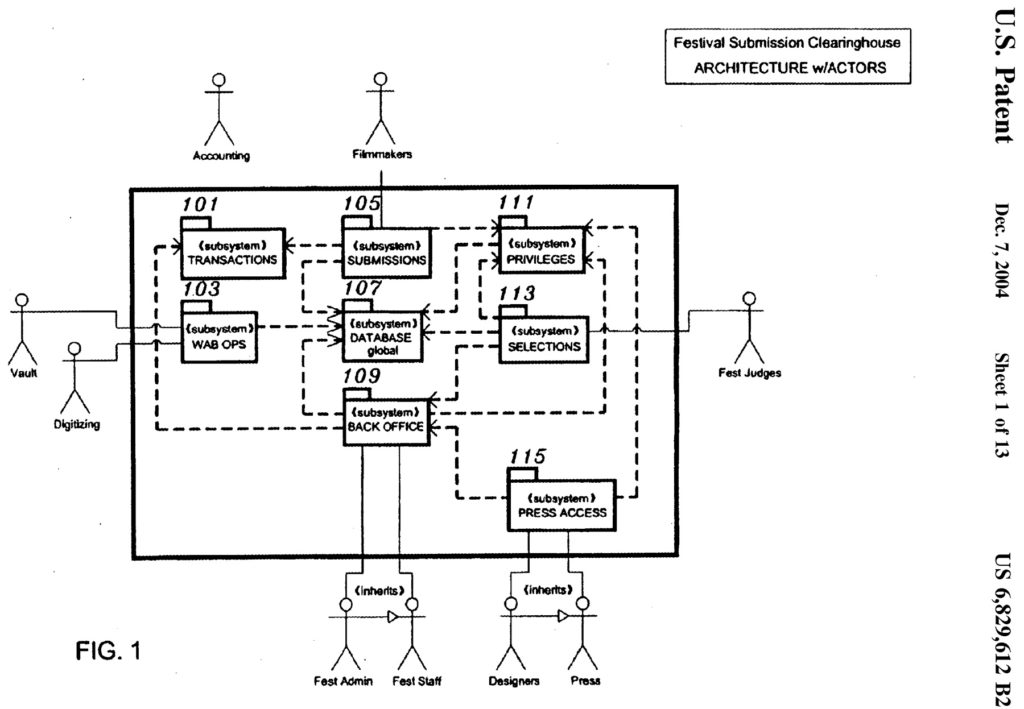
Withoutabox scheme – Patent US6829612
At the end of October, the film submission platform Withoutabox announced that it would be ceasing operations by 30 October 2019. All obligations towards filmmakers and festivals are to have been settled by then. The closure is timed to correspond with the expiration of a patent that had previously guaranteed Withoutabox a monopoly position in the USA.
Withoutabox can look back on almost twenty years of highs and lows. Its launch was revolutionary. In the summer of 2000, Without A Box Inc. went public with a paperless online festival registration service under the slogan “One Form – Once!” What seems a matter of course today was a major innovation back then: for the first time, filmmakers could register their films at several festivals at once at the touch of a button after filling out a single form. Before then, registration forms had to be requested from the festivals, which were then filled out by hand or typewriter and sent by post or fax to each individual festival.
Festivals benefitted from the new system by being able to present themselves to a wide group of filmmakers on the platform and then retrieve submissions online or integrate the entire correspondence with filmmakers into their own IT system. Preview copies still had to be sent in physically, however (VHS tapes and later DVDs).
In the early years, the platform’s fee structure clearly favoured filmmakers. No wonder, because the founders were filmmakers themselves. Joe Neulight and David Straus had achieved international recognition at festivals with their short film “god@heaven”. Their filmmaker-friendly project was an instant success. Just two years after its founding, Withoutabox had already taken on 13,000 filmmakers as members and 120 festivals as clients, among them the Sundance Festival.
In the following years, Withoutabox (WAB) grew steadily and expanded to Europe. Soon, however, the owner-managed business caught the attention of “New Economy” corporations that were prospering once again after the dotcom bubble had burst.
In January 2008, Internet Movie Database (IMDb), a subsidiary of Amazon, bought Withoutabox for an unpublished but probably quite substantial sum. Subsequently, the services of IMDb and WAB were integrated and various technical innovations such as streaming videos were tested. At the same time, the fees were raised significantly and the price structure changed to favour festivals that signed exclusive contracts. The high fees and comparatively user-unfriendly interfaces started alienating more and more filmmakers, along with festivals that did not want to be enslaved by the monopolist. By 2012, as technical development stagnated and the services lagged far behind the state of the art, so much anger had accumulated on the film scene that worldwide campaigns were launched calling for a boycott of the platform.
In order to exert pressure, Amazon made use of a US patent applied for and granted in 2004, before acquiring Without A Box Inc., which gave WAB a monopoly position in the USA. The effect was to stifle competing initiatives, while festivals that did not want to play along were threatened on the one hand and on the other rewarded with profitable contracts. According to Indiewire, some festivals today receive more than $100,000 in annual payments from the platform’s revenues – ultimately at the filmmakers’ expense.
It was not until 2014 that the monopoly position could be broken, when across the border four Canadians in Ontario founded the start-up FilmFreeway and aggressively marketed themselves as the technically better, friendlier and cheaper alternative to WAB. In just a few years, FilmFreeway had overtaken the flagship WAB, which since then has seemed paralyzed. This year, filmmakers can register for some 7,000 festivals on FilmFreeway, while Withoutabox has stagnated at just over 1,000 festivals.
Patent US6829612 expires in 2021, and it is probably fanciful to think it could be extended. It is hard to understand why it was approved in the first place, as the only thing new about it was its application to the festival registration sector, but not its basic principles, i.e. the linking of databases and their online administration.
Against this backdrop, it is easy to understand why Amazon is now pulling the plug on WAB. No one is likely to shed a tear at its departure, but there is one caveat: WAB was in recent years a comparative stronghold of serious festivals, while the new North American monopolist FilmFreeway is in the meantime home to far too many festivals whose core business is not showing films but rather raking in submission fees. There is still hope, however, that the expiration of the patent will finally clear the way for other initiatives embracing the original, sound idea of the founders.
“We do not encourage film festivals to make us their only way to accept submissions. The ones that are choosing to do so are doing it because they realize it makes their life easier as well. The reason we are not encouraging them to do it is because filmmakers want choice and we want to be their advocates for choice.” (quote from an interview conducted by Reinhard W. Wolf with David Straus and Joe Neulight, 25 November 2002)
Article about Withoutabox.com published on shortfilm.de on 11 December 2002
still available online thanks to the Wayback machine from Archive.org!
1 Trackback